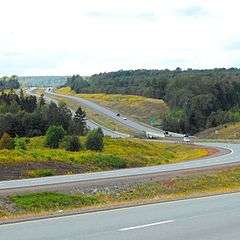Cobequid Pass
The Cobequid Pass is the name given to a 45 km (28 mi) tolled section of Nova Scotia Highway 104 (the Trans-Canada Highway) between Thomson Station, Cumberland County and Masstown, Colchester County in the Canadian province of Nova Scotia. The section is a public–private partnership; the highway is owned by the Highway 104 Western Alignment Corporation, a Crown corporation of the Government of Nova Scotia, with a toll plaza operated under contract by Atlantic Highway Management Corporation Limited, a subsidiary of Aecon Concessions. The toll plaza is located near the halfway point in Londonderry.
| |
|---|---|
| Route information | |
| Length | 45 km (28 mi) |
| Existed | November 15, 1997–present |
| Major junctions | |
| West end | |
| East end | |
| Highway system | |
| Provincial highways in Nova Scotia 100-series | |

Name
The Cobequid Pass received its name from a combination of the Cobequid Mountains (which the highway crosses over) and the word "bypass". There is no geographic feature in Nova Scotia, such as an actual mountain pass in the Cobequid Mountains, having the name "Cobequid Pass".
History
This section of highway opened as a 4-lane divided freeway on 15 November 1997, with the prior alignment of Highway 104 between Thomson Station and Masstown being re-designated as part of Nova Scotia Trunk 4. It has a posted speed limit of 110 kilometres per hour (68 mph) throughout, except for a posted speed limit of 50 kilometres per hour (31 mph) for a 1 km (0.62 mi) section at the toll plaza.
The Highway 104 Western Alignment Corporation was created by a provincial statute, the Highway 104 Western Alignment Act, whose sole purpose was to finance, design, construct, operate and maintain this new alignment of highway. The Cobequid Pass Toll Highway was built with CAD $66 million in private financing (from CIT Financial) and CAD $27.5 million from the Government of Nova Scotia and CAD $27.5 million from the Government of Canada.[1] The private financing loan is being paid back through tolls collected at a toll booth located between KM 72 and 73 in Londonderry, Colchester County. Tolls for this section are currently (2013) established at $4 for cars and $3.00 per axle for commercial vehicles.
There is both electronic toll collection as well as toll booth operators who only accept cash. Toll collection operations are run by Atlantic Highway Management Corporation Limited (AHMCL), which is a subsidiary of the contractor, Atlantic Highways Corporation (AHC). Both are now owned by Aecon. AHC guaranteed the highway for three years, which was an unprecedented warranty period at that time, and all deficiencies were repaired at their expense. Since the warranty expired in 2000 maintenance has been performed by the Department of Transportation & Infrastructure Renewal.[2]
1994-1995 funding controversy
Prior to this new alignment, Highway 104 ran east and south from Thomson Station for 53 kilometres (33 mi) to Masstown on the present alignment of Trunk 4 through the Wentworth Valley and over Folly Mountain. This 2-lane uncontrolled access section included climbing Folly Mountain and was nicknamed "The Valley of Death" due to an increasing number of accidents with a high fatality rate that were occurring in the early to mid 1990s; it was political pressure resulting from these accidents that forced the cash-strapped provincial government to pursue toll financing for the realignment section now known as the Cobequid Pass Toll Highway.[3]
Beginning in the fall of 1994 and continuing into 1995, national and local media began reporting on a controversy involving the $27.5 million funding for this project from the Government of Canada. It was revealed that the federal Minister of Public Works, David Dingwall, had attempted to redirect approximately $26 million of highway funding designated for Nova Scotia from the proposed bypass of the Wentworth Valley toward upgrading sections of the Fleur-de-lis Trail, a scenic highway that ran through Mr. Dingwall's federal riding of Cape Breton—East Richmond, as well as that of provincial Minister of Transportation and Public Works, Richard Mann's riding of Richmond. The controversy was capitalized by the Reform Party of Canada which erected a large sign beside the highway at Glenholme which read:
Mr. Dingwall
$26-Million is Highway Robbery
Give It Back To Highway 104
Reform Party of Canada
— Sign at Glenholme, N.S. as quoted by Jeffrey Simpson on 21 June 1995, In Nova Scotia at least, all roads lead to cork barrels, The Globe and Mail
References
- Highway 104 Western Alignment Corporation: Funding & Financing
- Highway 104 Western Alignment Corporation: Administration & Accounts
- Simpson, Jeffrey (21 June 1995). "In Nova Scotia at least, all roads lead to cork barrels". The Globe and Mail.
.png)
